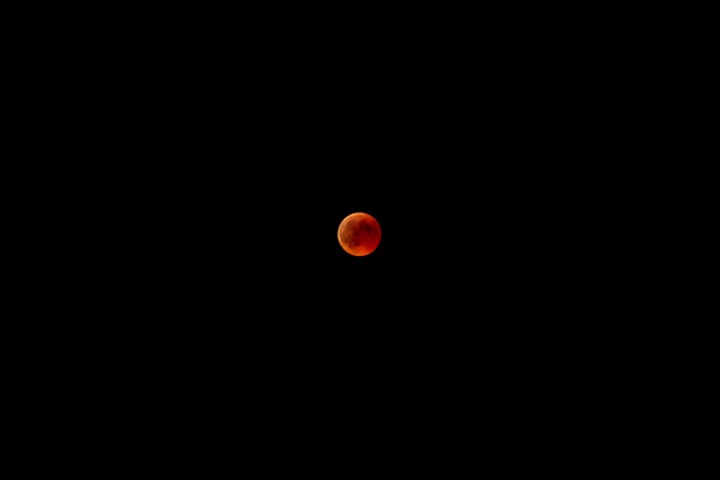Mars in Retrograde 2020
This October 2020, you will never see Mars so bright again! This tiny red planet we mistake for a second moon goes retrograde September 9 until November 14 2020. Here's my take on how Mars carries on...

The Martian
Based on the novel that was self-published in 2011 by its author Andy Weir, 'The Martian' was adapted by Drew Goddard to screenplay. Released in 2015, the movie was directed by Ridley Scott and stars Matt Damon as the first human ever to colonize Mars. Jumping ahead to the year 2035, Botanist and Astronaut Mark Watney is left behind after a mission to Mars abruptly ends. He survives alone on Mars for 549 Sols (which totals 564 Earth days) with only the left behind belongings of his crew and very little food supply. Some of those belongings is in the form of human waste, so Mark gets creative and fertilizes the first known Martian potato farm until NASA can figure out how to rescue him.
In my opinion, Matt Damon does awesome in roles that let him be sarcastic and serious at the same time. I never watched him in any of his 'Bourne' movies and this film reminded me why! Sometimes creativity and a bit of humor is the only thing during a life altering experience that helps us get through it. Hulu has this title, but only if you also have their live TV subscription.
The Day the Earth Stood Still
The short story 'Farewell to Master' by Harry Bates was first published in the magazine Astounding Science Fiction for its October 1940 edition. You can find it on Barnes and Noble by clicking this link to read the $1.99 NOOK book (ebook). It was adapted in 1951 by Edward H. North into the well known Sci-Fi screenplay 'The Day the Earth Stood Still'. The remake of this movie starring Jennifer Connelly was released in 2008, and it also stars my favorite actor, Keanu Reeves. Anyone else remember his 1980's role in 'The Prince of Pennsylvania'? This Sci-Fi title is available on basic Hulu right now. Be prepared for an opening scene that will give you goosebumps!
Klaatu, who hails from Mars, is on Earth to warn humans that we must learn to live peacefully. Otherwise, we will destroy ourselves through our own violence and the misuse of Nuclear energy. Why does this sound so familiar? The late Stephen Hawking foretold a similar fate for us when scientists discovered the long theorized 'God Particle'. All gains in science come with risks. Naturally, by nature, everything about the known Universe shows us we are in a constant cycle. Perhaps discovering how to split the atom advanced the human race...but at what cost?
"I am become death, the Shatterer of Worlds."
~J. Robert Oppenheimer
War of the Worlds
This movie was based on another book about Martians visiting Earth from Mars. H.G. Wells published a novel in 1897, 'War of the Worlds'. You can purchase a copy or read it online by clicking this link, which will take you to Barnes and Noble. It was turned into a Science Fiction radio sensation four decades later.
On October 30, 1938, the Columbia Broadcast System (CBS) aired a series 'War of the Worlds' from the Mercury Theatre on the Air. Narrated and directed by the actor Orson Welles, he adapted the novel into a hit American radio series. Newspapers attempted to cause mass hysteria and panic as their headlines about the radio show lingered for a month afterwards. Based on the novel, the radio show was a dark, sadistic, satiric spin on what it might have sounded like if Earth really had been invaded by sinister aliens from Mars in 1938. By the end of the Martians attempt take over the planet and use Earth for its natural resources...they only wound up dead from human pathogens they had no immunity from. And how does that fit into the kind of panic that any virus pandemic can cause?
'War of the Worlds' was an iconic point for the broadcast radio entertainment business. It was made into a 1957 movie starring Ann Robinson and Gene Berry. Then Steven Spielberg directed his remake in 2005, which starred Dakota Fanning and Tom Cruise. You can watch 'War of the Worlds' on Hulu with the HBO Max subscription.
I loved this movie! It's something you can watch more than once. Let me make you aware that it may just give you bad dreams. I cannot imagine what the radio show sounded like during the naïve year of 1938. I bet there's a recording out there somewhere!
Mars

When you look up at our Moon, you may recently have spotted a strange spot of red glowing nearby. This is the planet Mars. Venus usually rules the early morning, while Mars reigns the night sky. It reflects a red hue due to all the rust in its ground. According to scientists, our Moon is also beginning to rust. But I'm pretty sure any red glow from that will take a few hundred-thousand years before it can be seen as the red moon of Earth. After 60,000 years, in August 2003, Mars reached the closest point to us, less than 35 million miles away! Mars appeared to be 85 times brighter and 6 times closer. Rumors of a second moon even began to circulate on the internet. While not as close right now, the recent distance is the closest Mars will be to us and our Sun until 2287, when it will be 34.60 million miles away from Earth.
During October 2020, Mars will be at its brightest for us than at any other time this year. On October 6 2020, we swing closer to Mars for a grand distance of 38 million miles. That kind of closeness won't happen for at least 15 years. About a week later, on October 13 2020, Earth will be directly between Mars and our sun. Mars won't be this bright again until September 2035. At present, you won't even need binoculars or a telescope to see the strange red glow of this planet. A clear, cloudless night sky will do. At progressively later dates, every other year, we swing between Mars and our Sun. The next lap will be December 1 2022.
Once upon a time, billions of years ago, this neighboring planet of ours had water. It is even believed to have been a host of life. There are clear indicators of rivers, riverbeds, lakes and even oceans. Water is the main building block of life as we know it. Back then, Mars had enough heat trapped near the surface to keep water as a liquid. It is the fourth planet from our Sun, 7th largest planet in our solar system, and is almost like a small twin of Earth. The Romans named it Mars for their God of War.
The orbit of Mars around the Sun takes 687 days to complete. It is half the diameter of Earth with a total of 2,106 miles. It's gravity is 37.5 percent in comparison to ours and one rotation on its axis takes 24.6 Earth hours. A Martian day is called a Sol, which is short for Solar Day. The tilt of Mars on its axis is 25.2 degrees, so this means its has seasons similar to Earth. It also has two Equinoxes where both hemisphere's receive equal illumination from the sun, just like Earth.
Mars also has quite a few differences. For instance, it is farther in distance from the Sun than Earth. The tilt of the planet while rotating on its axis, and the less circular orbit Mars makes around our sun, cause seasonal changes on this rusty little planet that are far from predictable. Get this: Winter on Mars can go as low as -225 degrees Fahrenheit! Summer on Mars can only get as hot as 70 degrees Fahrenheit. I don't know about anyone else, but I would definitely stick to the tropical climates while vacationing there! You may wind up with not just a sunburn, but frostbite as well. I wonder if scientists will develop a new kind of sunscreen with a different name for Martian climate SPF, as well as a new type of measurement for this product? I hope it won't be expensive...bad enough bottled water will be hard to come by. Everything on Mars will probably be overpriced, too! Which leads to another question about us colonizing Mars: Will there be Martian currency with an exchange rate? Does Earth even have a currency? I mean, these are pressing inter-planetary space travel questions scientists need to consider before actually colonizing another planet!

We have been exploring Mars robotically since 1960. Elon Musk has been ironing out kinks of his planned trips for us, and other scientists have been toying with the idea to eventually have humanity colonize Mars for years. We know it takes one year to travel there, and assuming all goes well in that year, surviving on the surface of this alien planet is another feat altogether...humans can get a bit nutty! Let's hope that on top of the experts in Botany, Medical, the Engineering and Technology fields, we make sure to get some competent Psychotherapists (who aren't like that evil Dr. Smith who hijack's the robot Will Robinson saved on the 2018 Netflix series 'Lost in Space'!) and Psychologists to Mars...FIRST, thanx!
Unlike Earth, Mars has no magnetic field and no tectonic plate system. It seems the planet had a self-powered, inner magnetic field about 4 billion years ago. Somehow it shut down and scientists are still trying to figure out why! This created a far thinner atmosphere on our neighbor than we have and prevents heat from becoming trapped near the surface. With no protective barrier like the one Earth has, Mars has been left vulnerable to the destructive particles from our Sun. This means the sunrays have just been stripping away the planet surface for billions of years, so no surface heat is even retained. This is why it's kind of cold there! Remember, Venus is the hot planet. There is obviously some oxidization happening on Mars for it to have rust. Ever notice that cars driven during the winter rust quicker than cars only driven in summer? That's because of the metal coming into contact with ice, water, and salt. Wintery, icy roads get salted and summer roads...well, DON'T. Scientists know Mars has sulfur in its crust and this is kind of comparable to epsom salts.
There are also frozen ice caps and frozen water beneath the surface of Mars. Carbon dioxide, nitrogen and argon make up the Martian atmosphere. Martian breezes reach up to 60 miles an hour and create pretty destructive dust storms across the barren, desert landscape. Whatever water and plant life that have ever been on the surface, have been wiped clean. Scientists would like to figure out if microbes on Earth that survive through hibernation periods in the coldest areas can survive on Mars' with its extreme temperature fluctuations! Even if there's not a lot of photosynthesis that most of the life on Earth need, there is life on our planet that likes sulfur, and little to no sunlight.
Scientists also discovered that Mars has a molten core, but no way for any heat it may generate to reach the planet surface. With no tectonic plate system the way Earth has, Mars has no geothermal system. So I guess Mars just kind of sweats rust? Weird, right? It's easy to understand why our ancestors called this little red neighbor of ours, which shines so red in the night sky, after a god of war!
The Moons of Mars
Mars has two moons, Phobos and Deimos, named for the sons of Greek counterpart of Mars, Ares. Phobos means fear and Deimos means dread, so these moons are kind of perfect for Mars, right? These two satellites of Mars were discovered by Asaph Hall, a week apart, in 1877. These moons are believed to have been formed when something slammed into Mars.
Who discovered Mars?
- 400 B.C. our Babylonian ancestors have been watching Mars in our night sky. We really don't have a specific 'discoverer' for record of Mars. In 1576, Danish Astronomer Tycho Brahe made the first accurate calculations for the position of Mars.
- From 1570 BC-1293 BC - Egyptians referred to Mars as Horus on the Horizon. Horus was their god with the dead of a hawk and body of a human. Egyptians also noted the retrograde motion of the planet, which makes it appear to travel backwards. Retrograde actually just means slowing down.
- 130 AD - Ptolemy publishes a book on his ideas on how the Universe worked. This became known as the Ptolemaic System. His hierarchy of the Universe was Earth, Moon, Mercury, Venus, and of course, Mars.
- 1580 - 1600 - Danish Astronomer Tycho Brahe who was Master of Uraniborg, an observatory built before telescopes that contained instruments to determine accurately the positions of objects in the observable night sky, correctly calculated the position of Mars.
Johannes Kepler, Galileo Galilei, Francisco Fontana, Christiaan Huygens, Cassini, Maraldi, William Herschel, etc, etc, and on! Mars has a long list of notable observers who wrote theories and raced each other to publish discoveries about it long before we ever had the ability to launch rockets and robots to investigate it.
Mars in Mythology
In Roman mythology, Mars was the son of Juno and Jupiter. The month of March was named for him. Just like the deity, Saturnalia, for the Fall and Winter, Mars also represents Agriculture. You can read my blog on Saturn here. Saturn, like a couple other planets, will be transiting through Capricorn until the end of 2020.
According to sowingtheseed.org, there was a collective Brotherhood of 12 priests dedicated to the deities of agriculture and fertility during the 5th BC - 1st BC Roman-era. Italians also knew Mars' as Silvanus, a protector of fields and boundaries, who was usually depicted dressed as a countryman. As a deity of wild nature, sacrifices in his honor were made in the Spring for bountiful Summer fields and a healthy flock, safe from predators.
Dry0copus Martius - Woodpecker
Also a god of prophecy, the woodpecker was named for him, and martius was considered the bird that he used for messages.
The two sons of Mars, Romulus and Remus, were considered the mythological founders of Rome. They also thought of him as the protector of the city and Mars' spear was kept in The Regions, a dwelling for ancient Kings. Legend says that a shield fell from the sky and it was believed to have belonged to Mars. It was among a total of 12 but the other 11 were just replicas. You see quite a bit of the number 12 in mythology, astrology, and astronomy. The original shield hidden within the replicas was commissioned by order of King Numa Pompilia because he wanted to hide the original from attackers who wished to destroy it. Mars' spear was said to dance and vibrate, foretelling an impending war. The commander was then supposed to shake the spear and shield, in order to appeal to the God of War for victory, before going into battle. To Spanish painter Diego Velazquez during the Baroque Period, Mars was a war-like god. A painting by Velazquez of Mars accompanied a series of his other paintings that decorated the Royal Hunting Lodge in Madrid, Spain.
'Descanso de Marte', The Rest of Mars - Diego Velazquez, 1640

In art and literature throughout history, a heavily romanticized relationship between the two most extreme opposites of the Human Condition, War and Love, have been wound together. Murals found in Pompeii depict a great love between Mars, the God of War and the Goddess of Love, Venus. During the Renaissance-era there were plays, prose, and paintings depicting him as the smitten lover of dominant Venus. Mars is thought of as a defender and protector of peace and fertility. It makes sense that the goddess of love, beauty, fertility and prosperity would be dominant of his affections. There is even a myth the mother of Mars' twin sons is one of the Vestal Virgins, Rhea Silvia.
Mars rules the sun sign of Libra and governs the 7th House in astrology. The 7th House represents marriage and partnerships, both emotional and business. This planet also represents masculine energy, just like the sign it rules. As I've written before, masculine energy is more extroverted and feminine is introverted. These astrological energies have little to do with gender traits, and more to do with their energy. In the beginning of the year, Mars was in Capricorn, and was visiting the 2nd House of wealth. Let's hope that as he has traveled into Pisces and the 7th House now, where he's going to be bouncing around for a bit while in retrograde, he gets the rest he needs to refocus his energy in a positive way for when he turns direct on November 14.
Pisces

There are two times of the year that we call the 'equinox', when the Sun is exactly above the equator. During these two very celebrated equinoxes that announce the beginning of Spring and Fall, the number of hours in the day and night are of equal length. The 'Spring Equinox' happens for the Northern Hemisphere on March 21, and the 'Autumn Equinox' that happens for the Southern Hemisphere is on September 23.
The rotational orientation of Earth has changed slowly over time, and it will continue to do so. The Vernal Equinox is when the center of the sun crosses the equator. Our perspective from Earth is that the vernal equinox will now lay in Pisces. The vernal equinox used to be called the first point of Aries...about 2,000 years ago! Here it is 2020 and depending on where you are on Earth, your perspective of the Sun, Moon, and stars that cross your horizon will be different from another.
The Sun travels through the sign of Pisces between February 19 and March 20, give or take a day every other year. As the twelfth sign of the zodiac, Pisces is represented by two fish. The Babylonians thought of it as two fish bound by a single cord. In Roman mythology, the two fish symbolize Venus and Cupid, who transformed themselves into fish so they could hide from the sea monster, Typhon. Pisces is one of the largest constellations in the night sky.
As the fish symbol of Pisces suggests, it is a water sign. The constellation is located in what is known as the 'Celestial Sea' where it is kept company with other constellations found in water. Aquarius, Capricorn, Cetus, and the Dolphin are just a few to look for this fall and winter. The element of water can be highly conducive when minerals, such as salt, are dissolved in it. Water is always moving and any particles can move freely in plain water but they will carry no charge. When salt is dissolved in plain water, it separates into electrically charged atoms that carry a charge to each compound. Plain water, plastic and glass are actually insulators and not conductors. For this reason, water signs are considered to have feminine energy and to be more receptive.
Signs that are grouped in water and earth elements (both feminine) are the emotional, empathic, creative signs in astrology. Pisceans can easily pick up on the moods of those around them and seek to connect with others on an emotional level. They never want another to feel alone and usually seek to understand. The negative side of Pisces is the way they can absorb the emotional states of others and get lost within themselves. The saving grace of some astrological signs is whether they fall into being mutable, fixed, or cardinal in their element. Pisces is a mutable water sign, and this means they seek to understand and transform. Perhaps this is why so many Pisceans are good with nourishing creative outlets? You will find a lot of Pisceans, or those who have a nice full birth chart with the fish, as psychics, musicians, painters, writers, nurses, therapists, or social workers. In order to purge their emotions (so to speak!) they revel in creativity! It can be a frustrating task to understand, and even fix others while trying to transform the world into a better place!
Pisces is ruled by two planets. The Planet of Luck, Jupiter, and Neptune, the God of Water in mythology both rule these fish.
I have written about Jupiter already, but have yet to cover Neptune! It is almost perfect that Mars is retrograde in Pisces and will next move into Cetus, the Sea Monster or Whale, while in it's retrograde motion! He has an opportunity to slow down and reflect, which is what retrograde for all the planets really means. It only appears to go in reverse. Retrograde is really the planet slowing down, while the rest of the Universe just continues on.
During retrograde, whatever the planet governs has time to slow down and reflect. For Mars, it is protection and defending that needs some refocus. He can replenish and re-nourish for the battle ahead, as all great warriors must do! Don't be too assertive in matters of the heart or business. Take all that extroverted energy and do the opposite for awhile. Go into yourself a little bit and think before you act or speak in any definite terms, especially on matters regarding marriage, relationships, or business partnerships, lest it comes back to bite you when Mars turns direct! Any decisions on matters in the 7th House that Mars governs during this time, will move full speed ahead when it goes direct. Mars itself seems to be sweating rust from iron running in his veins. In mythology, it would be written that perhaps a battle dehydrated him and without replenishment, he became devoid of body heat and humidity needed to continue on...thank the Gods for the Celestial Sea! And feminine Pisces! Is this the kind of balance Chinese philosophers were thinking of in their references to Yin and Yang?
Pisces is a sign of adapting and transforming emotional states into a clear communication style when all the other signs are confused. This way we can better understand ourselves and others. Unfortunately, mythology points out that the fish were originally running from their predator. Since Mars is all about protection and defense, there may be a bit of a battle ahead after Mars is done with his wade in the 'Celestial Sea' between the two constellations, Pisces and Cetus. For now, bright red Mars is calling our attention to him in the night sky. Time to reflect and refocus during his retrograde motion from September 9 to November 14 2020!
Did you like what you read? If you did, why not leave me a tip? If not, you can check out my profile to see what else you like! Don't forget to ❤heart❤ the stories that you do like on my profile!
About the Creator
Lady Sunday
I'm a self-publishing author of fiction and I love to research and write creative non-fiction.






Comments
There are no comments for this story
Be the first to respond and start the conversation.